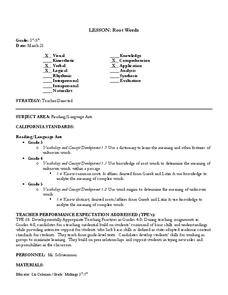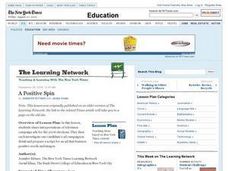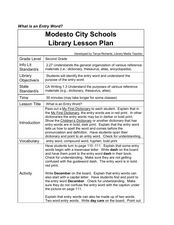Curated OER
Word Reference Materials
A class discussion on reference materials opens up a lesson on how to use these important resources. They discover that dictionaries, glossaries, and thesauruses are called word reference resources, and they practice using them. The...
Curated OER
Using Prefixes, Suffixes and Root Words to Improve College Level Vocabulary
Grow vocabulary skills with an understanding of affixes and word roots. Included here are a few activities and plenty of materials you can use to support your learners as the focus on building vocabulary.
Curated OER
Learning Vocabulary by Using Reference Materials
Finding engaging ways to help your middle schoolers build their vocabulary is not easy to do. The lesson presented here offers a great way to motivate them to build vocabulary by making it into a game. Teams of pupils use a dictionary...
Scholastic
Choose Your Words Wisely (Grades 9-12)
Words, words, words. The function of words in persuasive writing is the focus of a group activity that asks members to analyze how words advertisers use are designed to influence targeted audiences.
Haut Gap Middle School
Root Words
Scholars demonstrate their knowledge of root words aqua and aud, and develop vocabulary skills by completing of a chart, handout, and worksheet using creative thinking skills, a dictionary, and a thesaurus.
EngageNY
Square Roots
Investigate the relationship between irrational roots and a number line with a resource that asks learners to put together a number line using radical intervals rather than integers. A great progression, they build on their understanding...
Curated OER
Using Word Referents
Students edit an existing piece of writing focusing of improving word choice. They create lists of words that can be used in place of the main topic and rewrite the piece using the new vocabulary.
Meadows Center for Preventing Educational Risk, University of Texas at Austin
Lesson 10 - Compound Words
Individually, words have power, but when added together, they can take on a whole other level of meaning. Readers learn about compound words in the 10th of 17 lessons of the Word Recognition and Fluency series. A script provides guidance...
Curated OER
Aquatic Roots
Young scientist use reference materials to research various local aquatic plants and or animals to find out whether they are natives or exotics. They investigate their impacts on people, other animals and the environment. High schoolers...
Meadows Center for Preventing Educational Risk, University of Texas at Austin
Lesson 12 - Ed Suffix with Unchanging Base Words
Understanding different verb tenses begins with knowing how to decode words. A lesson on the -ed suffix with unchanging base words introduces readers to the past tense. Teachers present the skill with oral reading and spelling...
EngageNY
Existence and Uniqueness of Square Roots and Cube Roots
Teach cube roots by building on an understanding of square roots. The third installment of a 25-part series asks learners to solve simple quadratic and cubic equations using roots. Scholars compare square roots and cube roots throughout...
Curated OER
Reference Materials
Students discuss reasons to use reference materials, identify correct reference material to use for specific information, find answers to specific questions by locating information in encyclopedia, dictionary, atlas, almanac, glossary,...
Curated OER
Classroom demographics
Learners use strategies to read and comprehend words and material. The use of technology is the backbone of this lesson and is essential for implementation.
Curated OER
It's Opposite Day
Celebrate Opposite Day by using a Visual Thesaurus to match words to their antonyms. They match a list of vocabulary words to their antonym counterparts using the Visual Thesaurus, and then they play Antonym Bingo with the words from...
Curated OER
The Tell-Tale Hearts of Writers
Knock, knock, knock...Creep out your class with a critical thinking lesson plan focused on word relationships in Edgar Allen Poe's "The Tell-Tale Heart." They investigate the relationship between word choice, mood, and...
Curated OER
A Positive Spin
Study word choice and connotation in advertising. Readers examine campaign ads, both negative and positive, from the 2006 mid-term election before discussing an article and analyze a campaign of any candidate they choose. Finally,...
Curated OER
What's in a Word?
Young scholars complete a unit on words, their origins, and their usage. They explore various websites, create a word ladder online, develop a list of anagrams, write a story using homonyms, and create a list of vocabulary words.
Curated OER
Dictionary Work - Entry Words
Second graders examine the use of entry words in the dictionary. In this dictionary use lesson, learners look at guide words in a children's dictionary as the teacher/librarian describes the characteristics of each entry. They complete...
Curated OER
Fluency: High Frequency Words
Boy, this lesson sounds like a high frequency blast. If you think that sounded sarcastic, it was. Learners watch as the teacher reads the high frequency word..... the! They read the word with the instructor over and over until they have...
Curated OER
Word Processing With Pizazz
Students use a word processor and some of its tools to create an exciting and visual autobiography. They download a sample letter and then create one of their own.
Curated OER
Multiple Meanings Game
Here is a simple activity that uses definition cards that match the appropriate words to their meaning. Pupils match the cards using vocabulary words from units of study. A very basic, but often useful, resource.
Curated OER
Make Your own Word Search
Young scholars use the internet to create their own word search. Following the directions, they use a puzzle making site to create their word search with words related to school. They practice navigating through various websites and...
Curated OER
Vocabulary through Text
Explore word meanings. Sixth graders identify examples of words with affixes while listening to the story Paul Bunyan by Steven Kellogg. They participate in the game "Pass the Parts" and practice separating given words into their root...
University of Minnesota
Memory Box
Teachers encourage using memory tricks, but do they actually work? Scholars test word association in a short yet engaging activity. They use 10 seconds to memorize as many items as possible and determine if they are more successful if...























